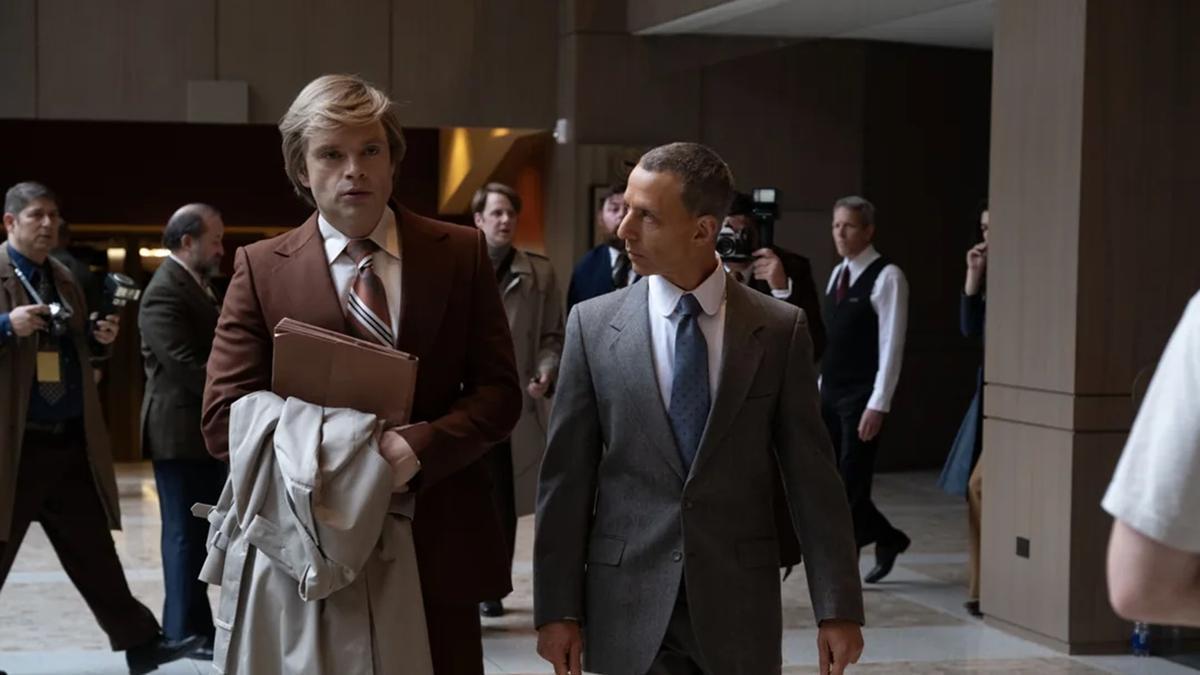
Ali Abbasi’s cinematic venture, The Apprentice, plunges viewers into a shadowy, unsettling journey through the formative years of Donald Trump. This film dares to pull back the curtain on the transformation of a young, ambitious real estate scion into the controversial figure known worldwide today. However, unlike the barrage of media coverage we’ve grown accustomed to, The Apprentice offers an introspective look at the corrosive nature of power and how one man’s aspirations, under the wrong tutelage, can spiral into moral decay.
Sebastian Stan tackles the formidable challenge of bringing the youthful Trump to life — a version far removed from the exaggerated figure that has appeared in political campaigns and social media storms. Stan’s performance is nothing short of remarkable. He captures Trump’s essence with unsettling precision, from the exaggerated pout and monkey-like gestures to the iconic smirk that would later become synonymous with his persona.
Yet, it’s the emotional journey Stan presents that truly resonates. He portrays Trump as a man still grappling with his identity, acutely aware of his willingness to break any rule to achieve significance. This portrayal hints at the ominous specter Trump would eventually cast over America’s political landscape.
The crux of Abbasi’s film is the relationship between Trump and the infamous lawyer Roy Cohn. Jeremy Strong delivers a spine-chilling performance as Cohn, embodying a cold, calculating mastermind. Known for aiding in the conviction of the Rosenbergs, Cohn is depicted as the manipulative force cultivating Trump’s darker instincts. Through Strong’s performance, we see Cohn’s recognition of Trump as a kindred spirit — someone as morally flexible as he is ruthless, eager to wield deceit and treachery to get ahead.
The dynamic between Trump and Cohn infuses The Apprentice with a perverse kind of bromance masked within its political narrative. Abbasi cautiously portrays their bond as eerily intimate, filled with mutual recognition of shared amorality. Their interactions are laced with a grim camaraderie that elicits discomfort, akin to witnessing Faust before he realizes the deal he’s struck. A subtly charged sensuality permeates their exchanges, where their mutual corruption feeds a sordid intimacy that stays long after the dialogues end.
Performances are paramount to the film’s impactful narrative. Strong’s Cohn is an intricate blend of manipulation and cynicism, with his outward charm barely concealing the simmering contempt within.
. His actions, whether it’s suborning judges, grooming Trump in media manipulation, or casually shattering lives, echo disturbingly prophetic tones. Meanwhile, Stan manages the incredible feat of rendering Trump’s early fumbling idiosyncrasies almost sympathetic. It’s only when Stan hints at Trump’s innate self-serving cruelty that we recall the character’s destiny.
Abbasi’s directorial prowess amplifies the pervasive unease that defines The Apprentice. Known for his blunt storytelling in works like Holy Spider, Abbasi explores his fascination with the sinister. He paints 1970s New York as an alluring yet decayed backdrop — a haven for those eager to exploit its faded splendor for personal gain. Kasper Tuxen’s cinematography mirrors this duality, capturing a city of both dazzling lights and decaying shadows, symbolizing the inner turpitude of its denizens.
The script injects sardonic humor into the storyline, though it resonates with a dark, gallows nature that provokes uneasy laughter. Trump obsessing over his hairdo or grappling with sartorial advice from Cohn offers a macabre hilarity. Yet, these comedic moments only deepen the grotesque evolution of Trump, reminding audiences of the figure being constructed. Abbasi masterfully controls when to allow laughter and when to abruptly end it with chilling reminders of the story’s themes.
The film’s final act slightly wavers as it focuses too intently on headline-worthy events. A notably explicit scene involving Trump and Ivana (portrayed by Maria Bakalova) seems discordant with the film’s initial psychological depth, slightly disrupting Abbasi’s gradual psychological build-up.
Ultimately, The Apprentice transcends merely chronicling a controversial man’s story. It critiques the myth-making surrounding Trump — the cultivated image of a flawless winner, perpetually unassailable despite consistent missteps. It’s a quintessential rise-and-not-quite-fall narrative, with Abbasi reminding us that the real tragedy is not Trump’s ascendancy but our passive observation of it unfolding. With Stan and Strong steering the ship, Abbasi’s depiction of this American nightmare is a chilling reflection not soon forgotten.
Originally expected in theaters today, The Apprentice’s Indian release has been postponed following a special uncut premiere screening.












